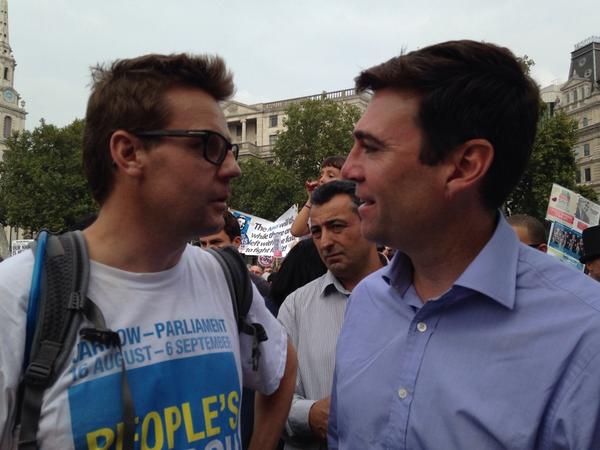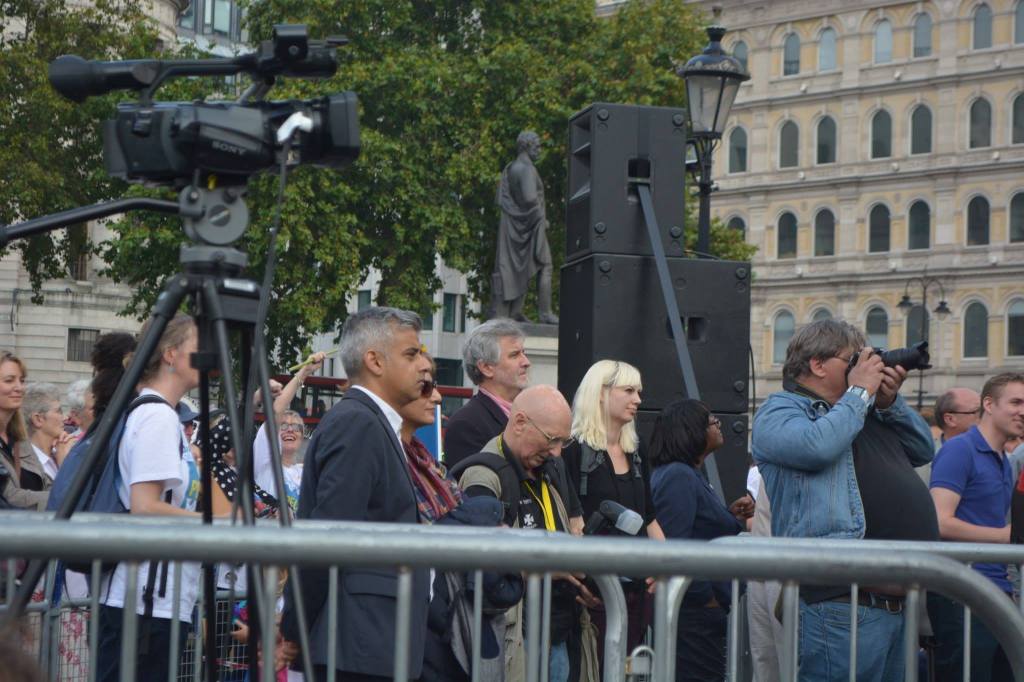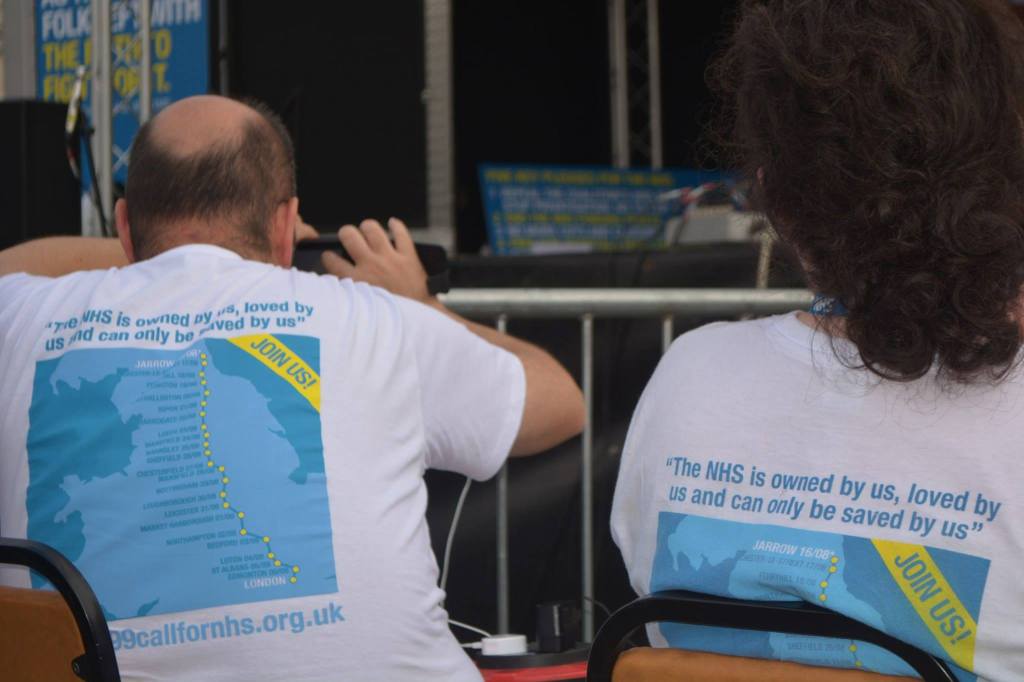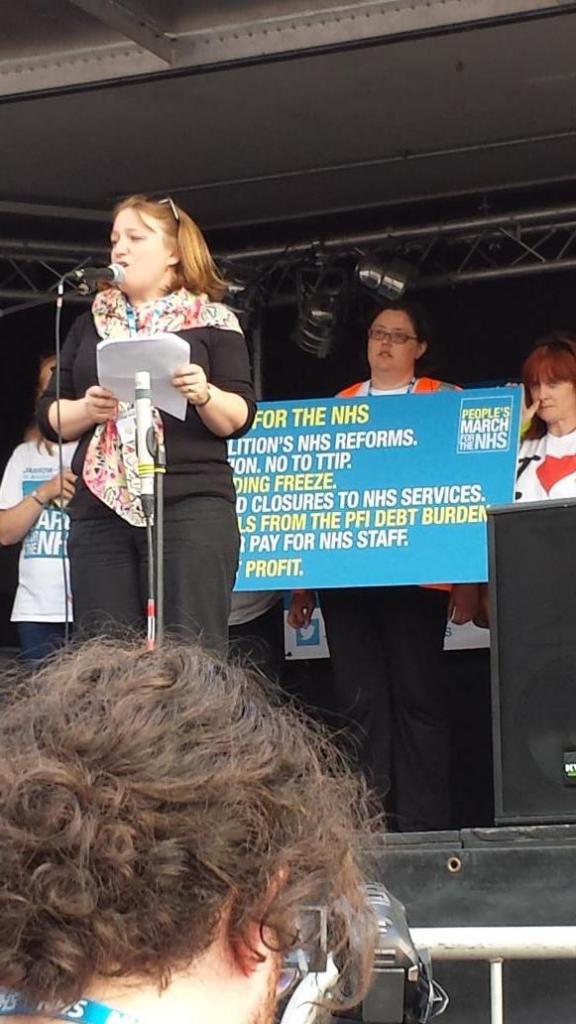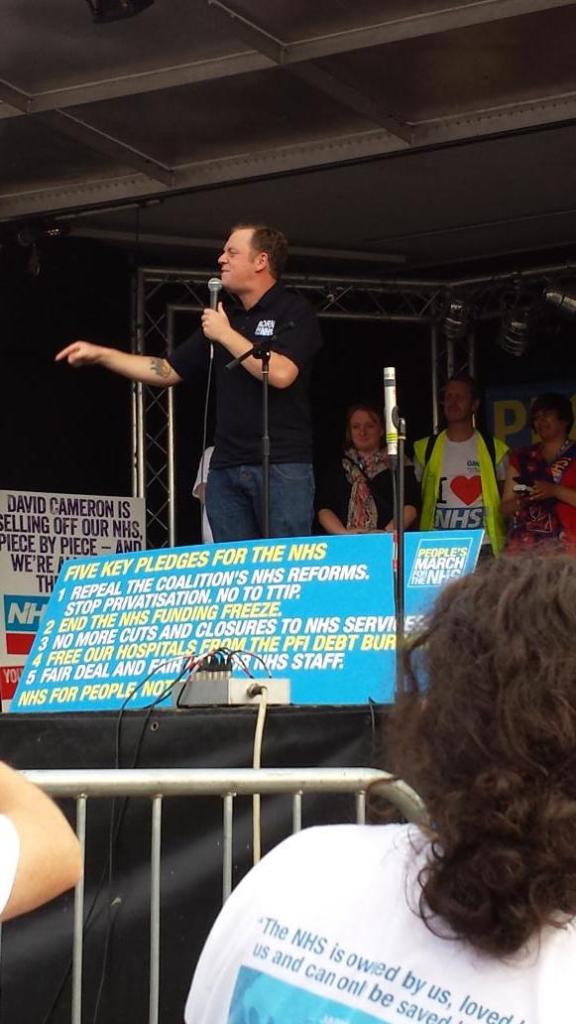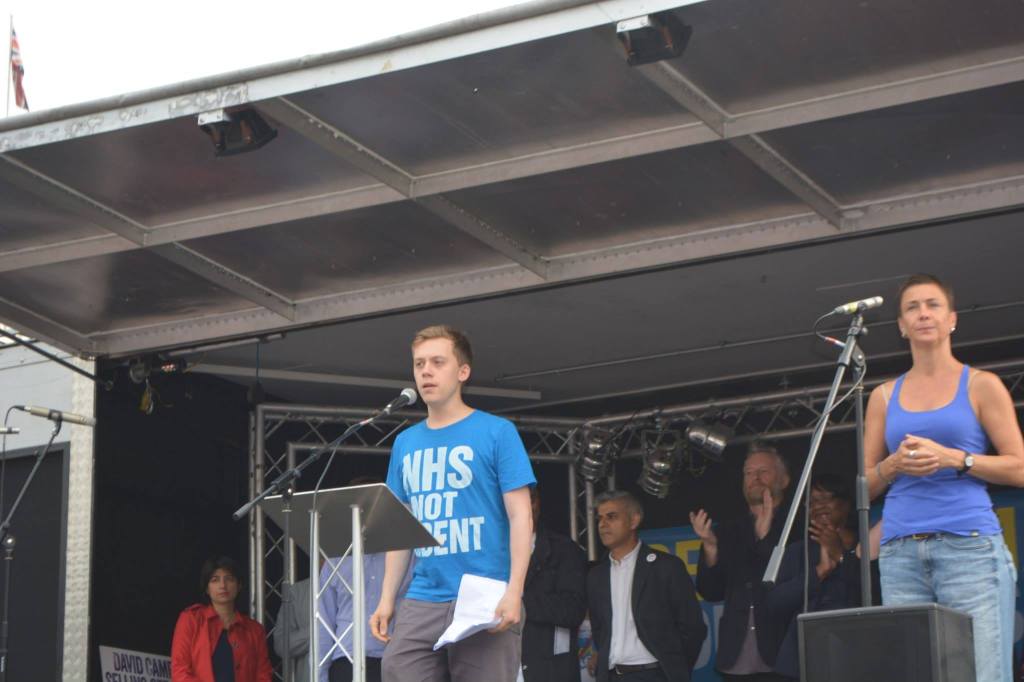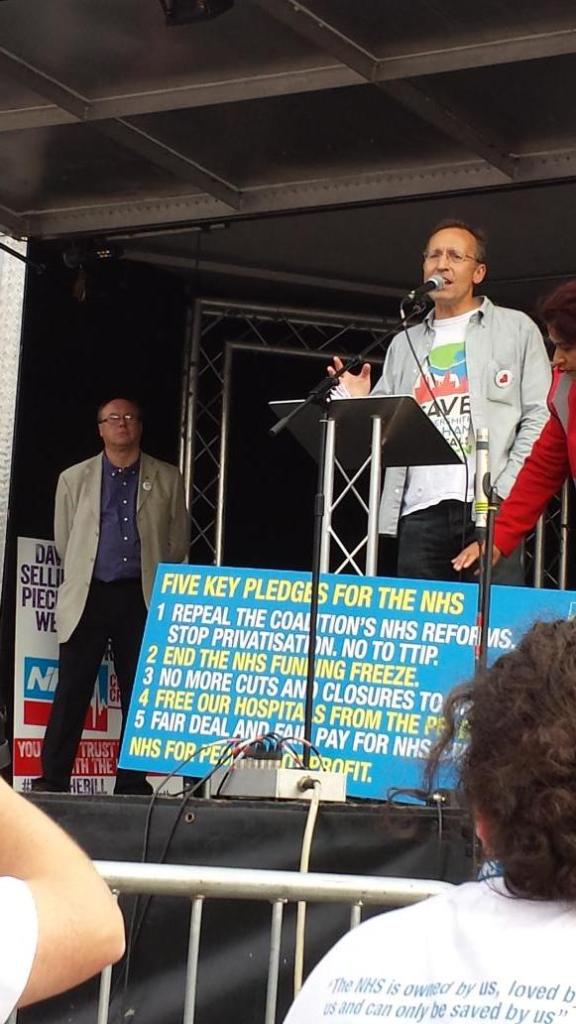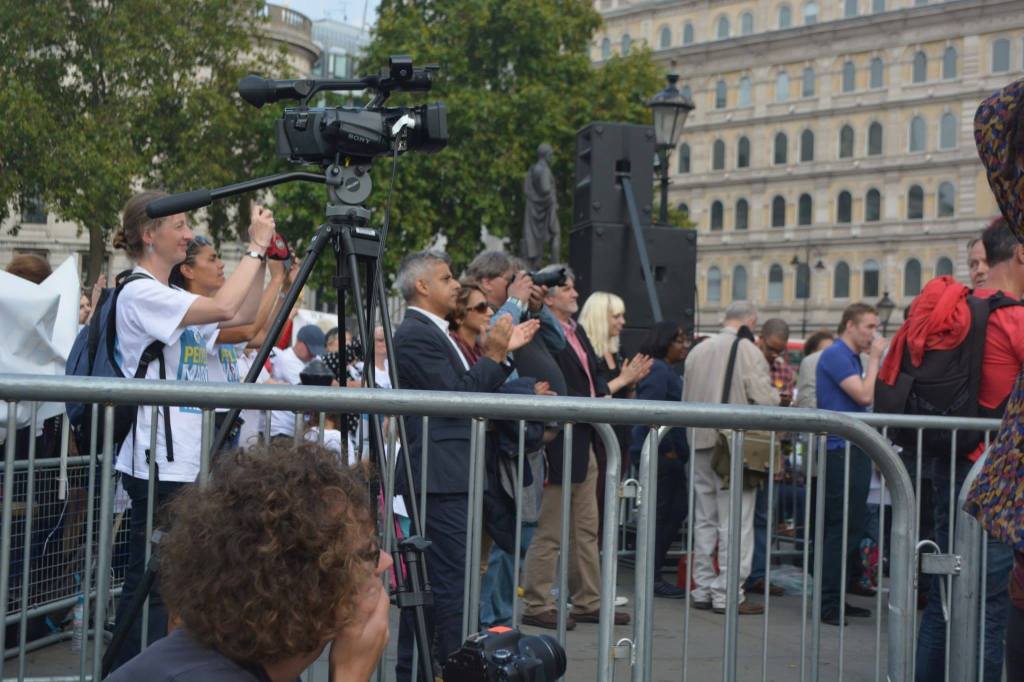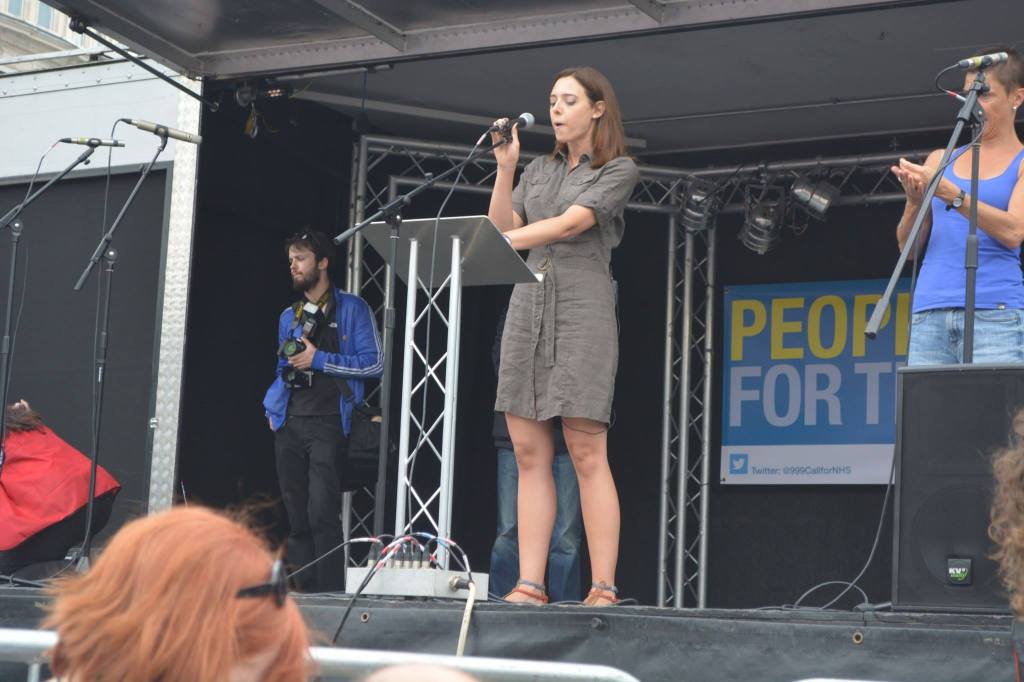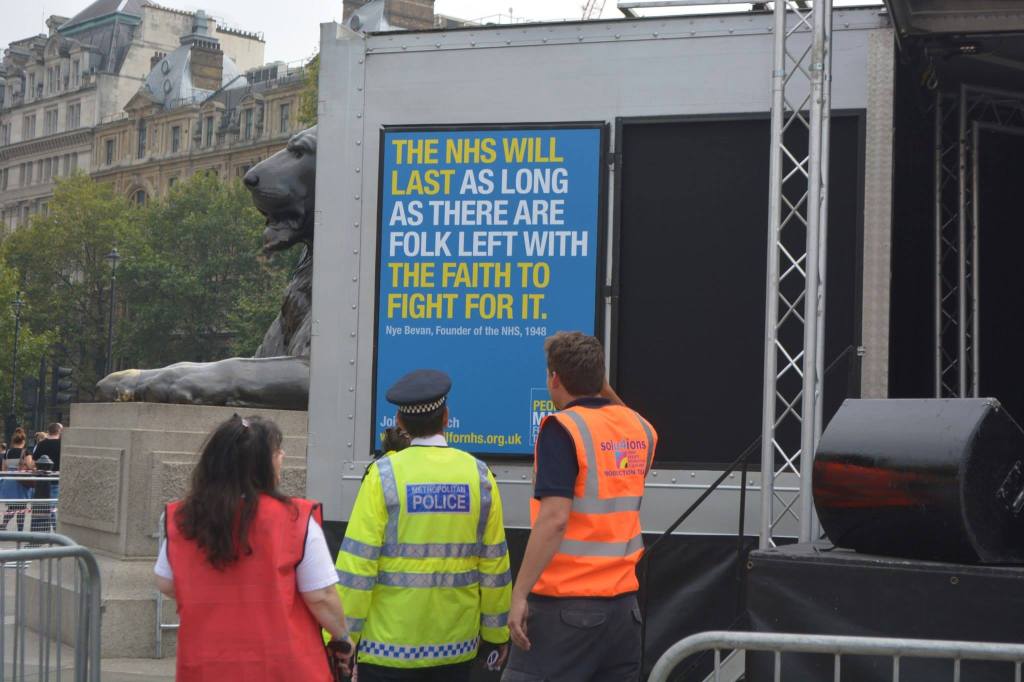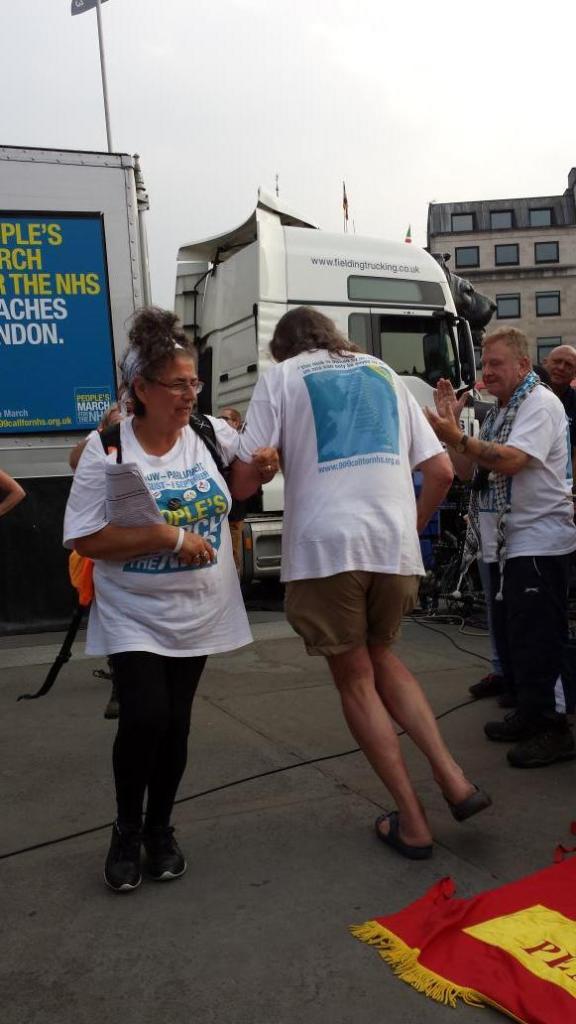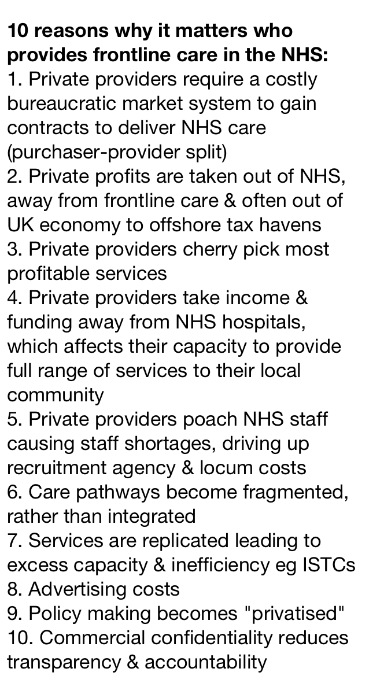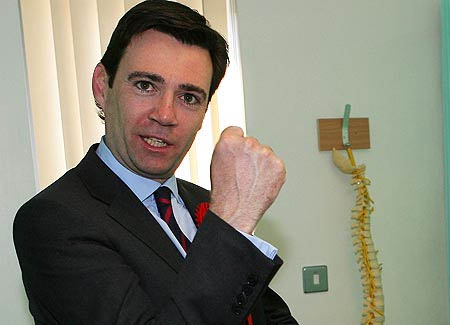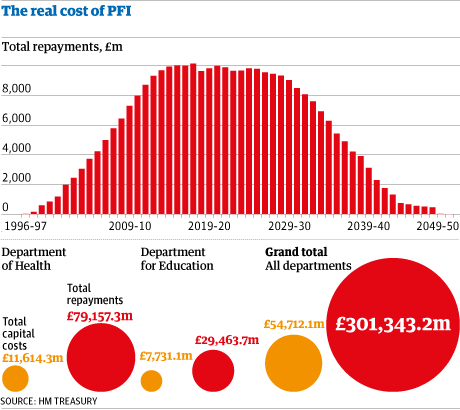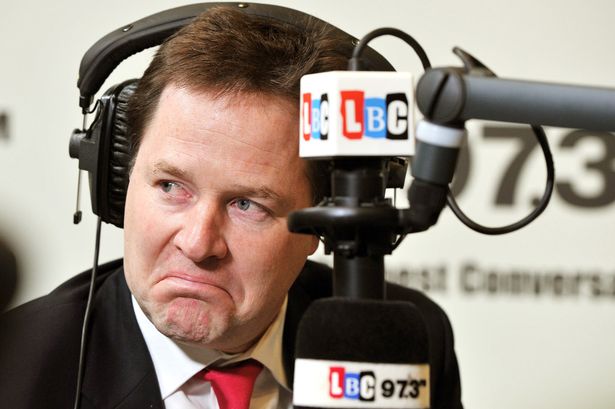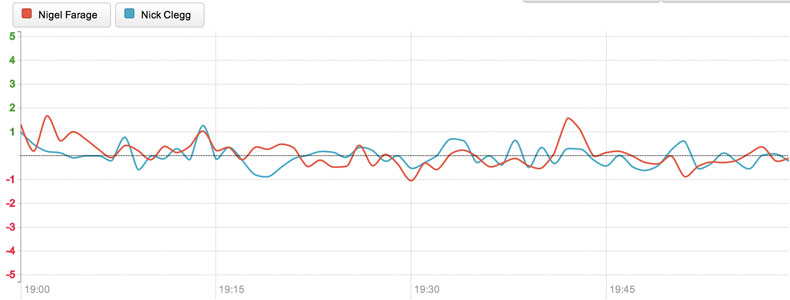Home » Posts tagged 'Clive Peedell'
Tag Archives: Clive Peedell
What is Clive telling Andy and does Andy need to listen?
I had the pleasure of going to two events at the weekend. On Saturday, I went to the event at Trafalgar Square for the #999CallfortheNHS #DarloMums arriving after their 300 mile-long walk across the country. Thanks to Jos Bell for inviting me, for which I am deeply grateful. The following day, I went to the National Health Action Party for their Annual Conference in Conway Hall, Red Lion Square, London. I enjoyed that afternoon as well.
The National Health Action Party are putting up parliamentary candidates for the General Election 2015, the vast majority of whom are known friends of mine. I am proud of them, and I really do wish them well. They give people a chance to vote for a party which has an established position against privatisation. The party is led by Dr Clive Peedell and Dr Richard Taylor, and they clearly have a strong position against privatisation of the NHS, and various manifestations of the NHS market including the private finance initiative and the EU-US free trade treaty.
They have made substantial progress this year. One of their challenges as a new party is having people recognise what they stand for, and this is clearly going to be hampered if the mainstream media do not give them a fair opportunity. Nonetheless, there have been noteworthy successes, such as appearances on Sky, LBC and “The Evening Standard”. And there is no doubt about the intensity of emotion in support of the National Health Service. A challenge is funding, and, whilst the party is in fact running a healthy surplus, having more funds will allow them to present a greater number of election candidates; an inevitably costly process.
It was very nice to chat with Dr Clive Peedell both before and after the event. I understand the misgivings about previous Labour policy, and indeed whether Labour can be said to be doing enough on abolishing the market. There are clearly strands of Labour policy which made room for private providers, but likewise it is also the case that the Lewisham judgment in the high court clearly stated that legislation under the present Government had been a clear departure from previous law under the last Labour government.
So it is not a surprise that many of the key pledges of the National Health Action Party will also be of concerns of some Labour voters with a keen interest in NHS policy. A slide of these were presented yesterday.
It is easy to underestimate the pernicious effect that the private finance initiative has had. Whilst it may have had good intentions of improving the infrastructure of the health service, one cannot deny how ‘cost savings’ allegedly in places have led to dangerous threats to patient safety, such as hospital infection, or in actual staffing numbers cannot be tolerated, not least by the general public and the clinical regulators. Whilst not all the problems can be held responsible from that desk behind Whitehall, the removal of the Secretary of State’s duty for the NHS is clearly symbolic. And Clive Efford MP perhaps would do well to learn from Peter Roderick, a public interest lawyer by training, and Prof Allyson Pollock, a world respected expert in public health.
Andy Burnham MP undoubtedly has a lot of goodwill too, and it is now likely that Labour will be the largest party of an incoming government at least under the leadership of Ed Miliband; they could win an outright majority, also, if the policy mix is right. Burnham has explicitly stated his desire to repeal the Health and Social Care Act (2012), but it is clear that a huge amount of work will be necessary to clear up the regimes for Trusts in financial distress, and for getting rid of competitive tendering tendering as being the default option.
It is not easy to let the Liberal Democrats ‘off the hook’, though it is clear that there are MPs such as Andrew George who have been strongly critical of the NHS reforms and indeed the “Bedroom Tax”. It is undoubtedly clear that the National Health Action Party will not be the main party forming Government next year, but they have never had aspirations to. They do allow the main political parties to be held to account, and their supporters are enthusiastic and well informed.
One of the critical tests for Labour will be letting go of the more neoliberal twangs to its policy, and to represent those people who had gone on the modern day NHS Jarrow march. It is not simply good enough to riposte every attack with ‘yeah but the NHS is free at the point of need’. There are genuine problems with solidarity, equity, justice, and comprehensiveness in current ethos, and a whole raft of problems which have arisen from indisputable marketisation and privatisation of the National Health Service.
It would be a mistake for Labour to discount the National Health Action Party as an insignificant blot on the landscape, when many of their concerns should be genuine concerns for Labour too. Andy Burnham is a highly skilled politician, but he has a strong vested interest in making a Labour government work properly for the NHS, and that might include for example not holding its staff to ransom yet again on a pay freeze. Andy as critical part of a Labour Government might wish to find a way to fund the NHS properly, especially since the economy is apparently making a recovery?
Whilst the present Coalition Government may seem ‘catastrophic’ to many of us, it has in fact been a blazing success for the Coalition parties. They have been able to do a lot of damage in the name of ‘austerity’. The evidence base for such policies is extremely poor, and indeed there is quite a lot of evidence that the welfare benefit ‘reforms’ have done a lot of damage to the mental health of citizens particularly those with disabilities.
Dr Clive Peedell has much to tell Andy, and – for what it’s worth – I do believe Andy needs to listen. And I have every confidence he will.
A triumph of optimism defeats cynicism as the Darlo Mums arrive in Trafalgar Square
The stench of sleaze from the backdoor lobbying culminating in the Health and Social Care Act (2012) was unable to overcome the sheer sense of euphoria and triumph of optimism defeating cynicism yesterday. Yesterday was history in the making, as all political parties were put on notice:
“Whose NHS is it? It’s our NHS”.
Whilst numerous governments have elaborated at length about the politics of ownership of public services, the message from the crowd of five thousand or so, within hearing distance of the Houses of Parliament, was loud and clear.
Many famous Labour members of parliament could be seen watching proceedings as the afternoon progressed, including Diane Abbot, Clive Efford, Jeremy Corbyn, Sadiq Khan, as pictured here.
It was a very sunny day here in Central London. There was a charged sense of energy, optimism and solidarity as about five thousand people attended a pro-NHS rally in Trafalgar Square, the culmination of a 300-mile march organised by a group of mothers from County Durham.
The group from Darlington, the Darlo Mums, are opposingthe privatisation of the NHS. It was very emotional when Rehana Azam announced the names of the Darlo Mums, “the most amazing people I’ve just spent the last three weeks with.”
The warmth of the #999CallfortheNHS campaign was evident throughout the whole afternoon. The event was immaculately organised, and was a thoroughly enjoyable event for all.
About 30 people had taken three weeks to march the full 300 miles from Jarrow in South Tyneside, organisers said.
Darlo Mums founder Joanna Adams said: “It’s been magic really. You only have to look over there [at the protesters gathered] to see people are behind the NHS and support what we’re saying. Joanna Adams described the mums as “ordinary”, but I beg to differ – they are entirely extraordinary in my opinion.
Andy Burnham MP, Shadow Secretary of State for Health, broke off all prior arrangements to attend, emphasising the indecency that would have occurred had he not come to represent the political party which had legislated for the birth of the NHS in 1945. Burnham’s speech was equally positive and optimistic about the future, speaking of the need to remedy public over privatisation, integration over fragmentation, people before profit, and collaboration over competition. Again, as is usual for Burnham who has great political gravitas, there was a sense of the current Government simply treading water in office until a person with substantial experience resumes office once again.
Burnham emphasised yet again that an incoming Labour government will repeal the Health and Social Care Act (2012) in its first Queen Speech, and said that it would then negotiate the UK out of TTIP, the transatlantic US-EU free trade treaty. Currently discussions are held in secret.
Sadiq Khan MP said the #Darlomums were the best England have had since 1966. As the MP for Tooting, Khan has been an ideal position to witness the effect the NHS changes have had on the nation’s capital.
Clive Efford MP described his Private Member’s Bill to repeal the damaging competition rules that the Tory-led Government inflicted on the NHS in its Health and Social Care Act 2012. The speech was very well received.
Even Dr Clive Peedell, Co-Chair of the NHS Action Party, called Andy Burnham’s speech “great”, having run 66 km himself to be there. It was announced that Dr Louise Irvine, an inner city GP and BMA council member, would be standing against Jeremy Hunt MP in the South West Surrey seat. Dr Peedell has of course seen at first hand the impact his specialty (oncology) has had on national politics, in the case of Aysha King.
And in the court of public opinion, according to the Daily Mirror last night, Dr Irvine was significantly more popular than Jeremy Hunt. We do know, of course, that the Daily Mirror do not comprise natural friends of Jeremy Hunt.
‘We keep on being told the NHS is unaffordable. THAT IS A LIE.”, said Rufus Hound. This lie has of course been one of the most powerful tools of the media who have called the consistent underfunding of services “unsustainable”.
Billy Bragg warned against blaming all cynicism on what one read in the media, saying that much cynicism was in people’s hearts – and this remained an obstacle for change.
Rehana Azam, as one of the marchers, NHS campaigner and leading light in GMB, and working mum, was one of the stars of yesterday’s event, explaining the necessary steps to get the NHS back on track.
Andy Slaughter, MP for Hammersmith and Fulham, recounted the demolition of his local NHS services, whilst Grahame Morris gave his account, as MP for Easington, of the fight against the Tories to protect the NHS. Andy Slaughter of course has a huge following in West London, and one of the key organisers of yesterday’s event Jos Bell was obviously pleased with the success of the event together with Andy Slaughter.
And finally, Question Musiq explained how he owes his life to the fast action of the Lewisham Hospital A&E in diagnosing his burst appendix, and performed his catchy rap song. Proceeds go to the Lewisham campaign.
A huge well done to everyone! A truly inspiring and memorable event.
Why it matters who provides the NHS – from Dr Clive Peedell
This is a graphic from a tweet by @cpeedell, Dr Clive Peedell, Consultant Physician and co-leader of the National Health Action Party.
Source: https://twitter.com/cpeedell/status/500931152639975426/photo/1
Click on the picture to expand it.
Burnham goes from strength to strength as ‘striker’, but who’s the David Moyes?
There’s no doubt Andy Burnham MP drives the Conservatives potty.
Despite the Conservatives’ best attempts to annihilate Burnham MP, Burnham keeps on scoring goals.
Meanwhile Jeremy Hunt continues to score blanks, apart from where profits from ‘Hot Courses’ are concerned.
But Burnham is more concerned about the day job, and that is running the NHS to a level of some degree of competence.
Hunt meanwhile continues to run his NHS into the ground, paying for costly advice on the managerial implementation of compassion, when he could be paying nurses to do the professional job they’re trained to do.
So Burnham can certainly hold his head up high as chief striker or scorer for Labour United.
As the Conservatives spit out the oranges from their half-time pep talk, as the oranges were in fact horsemeat due to the abolished Food Safety Agency, it’s time to recapitulate.
Clive Peedell kindly tweeted the other day points on which he would like Labour to play ball.
@legalaware @andyburnhammp 1. Fill £30bn funding gap by abolishing PFI & cracking down on tax avoidance 2. Get NHS exempted from TTIP
— Clive Peedell (@cpeedell) April 22, 2014
Before the 2010 election, Liberal Democrat leader Nick Clegg indeed condemned PFI as “a bit of dodgy accounting – a way in which the government can pretend they’re not borrowing when they are, and we’ll all be picking up the tab in 30 years”. It’s well known that PFI is a relic of the John Major government from 1995 (predating New Labour in fact). In opposition, Osborne pledged that the Conservatives would stop using PFI and denounced Labour for relying so much on a source of finance that he said was “totally discredited”. “We need to find new ways to leverage private-sector investment. Labour’s PFI model is flawed and must be replaced,” Osborne muttered in November 2009. Indeed Margaret Hodge, chair of the powerful Commons public accounts committee, said the coalition had failed to come up with the promised alternative since coming to power. The facts speak for themselves.
And Burnham is handicapped by not being the actual Secretary of State for Health at this crucial time for the NHS.
He nonetheless did go to Strasbourg last month to try to explain the case:
(This is a video recording I took of Andy’s talk at the Southwark Labour meeting recently.)
Labour will need to abolish PFI contracts or renegotiate them or both. But Ed Balls will need to be on the wing to help Burnham shoot. And it’s hoped the football manager is not asleep on the job. Labour has indeed proposed a five point plan to tackle ‘tax avoidance’. Labour supports a form of country-by-country reporting. It would extend the Disclosure of Tax Avoidance Schemes regime, which Labour introduced, to global transactions. It would open, further, open up tax havens, with requirements to pass on information about money which is hidden behind front companies or trusts. Crucially, Labour also wants to see fundamental reform of the corporate tax system. But Peedell’s work is not done.
@legalaware @andyburnhammp 3. Abolish purchaser provider split 4. Improve NHS accountability with transparency & openness — Clive Peedell (@cpeedell) April 22, 2014
The abolition of the purchaser-provider split remains one of the totemic political decisions to be made, as is not a ‘deal maker’ for many grassroots voters.
In fact, the whole issue of whether the general public is interested by public health or competition remains uncertain.
Nonetheless, a pioneering integrated healthcare scheme in New Zealand has improved the care of patients while reducing demand on hospital services.
On the contracting side, the report said that the abolition of the purchaser-provider split in the health system was important as it gave boards the autonomy to decide how to fund their hospitals.
The project was launched in 2007 in response to rising hospital admissions and waiting times and to a population that was ageing more rapidly than in other parts of New Zealand and other developed countries.
Similar to the drive towards whole person care in this jurisdiction, is aim was to create a “one system, one budget” approach to health and social care, together with various aspects as centrepieces: sustained investment in training, support for staff to innovate, and new forms of contracting, including abolition of the split between healthcare service purchasers and providers.
The outgoing NHS England chief executive Sir David Nicholson last year told HSJ his organisation was looking at “whether the straightforward commissioner-provider split is the right thing for all communities”.
Hospitals wish to focus on delivering better services to patients and often get frustrated by the amount of time they have to spend negotiating contracts with commissioners with the legal shutgun pointing in the direction of their necks.
And there’s no doubt there’s a steady stream of whistleblower tragedies, with Raj Mattu the latest in the long line of casualties.
People still struggle to think of a NHS whistleblower who has had a good outcome.
The Nursing Times ‘Speak Out Safely’ has only so far succeeded in signing up 30% of NHS Trusts.
Most people accept that the whole system is rotten, not least in how clinical regulators appear to pass the buck or even worse target whistleblowers.
Many do not think the Public Interest Disclosure Act, enacted by New Labour is 1998, is fit for purpose either.
So Clive Peedell is right, but Andy Burnham may have trouble in shooting goals on target with nobody on wing or a manager more concerned about ‘One Nation’.
Moyes, sacked by United on Tuesday after the 2-0 defeat at former club Everton on Sunday confirmed their failure to secure Champions League qualification, oversaw just 51 games in charge of the team after succeeding Sir Alex Ferguson last summer.
Moyes, like Ed Miliband, though had his army of people who thought he was doing a good job.
But Burnham like many, although focused on sorting out the undeniable problems of the NHS, is avoiding relegation for his team too.
I certainly don’t want to ask who the Ryan Giggs is. That certainly would be tempting fate.
Everything Clegg does he loses. Let’s get him to campaign for NHS privatisation properly.
Everything Clegg does he loses. Now is probably an excellent time to get him to campaign for NHS privatisation properly. Nick Clegg’s party, with the help of Baroness Williams and competition law loving members of the House of Lords, helped to get on the statute books one of the most corrosive statutory instruments for the NHS ever.
No ‘worm’ is needed to tell you that.
But if you’re talking about worms, Clegg was bringing up Farage’s rear for most of the evening.
And, as for the other YouTube metric, Farage won hands-down, although there were no ‘knockout blows’.
Nigel Farage did have two tricks up his sleeve which were interesting from a socialist perspective, ironically a few hours before Tony Benn’s funeral at Westminster.
Farage railed against free movement of capital a number of times, making loud anti-corporacy noises.
This is highly significant as the growth of the multinational, even beyond the increasing provision of NHS services by the private sector, has been a major concern for many NHS campaigners.
There has been a tendency for NHS campaigners to focus on the battles of the past, rather than anticipating the battles of the future. However, the campaigns that some campaigners have fought, for example on section 75 or clause 119, have gone very well despite the end-result (an artifact of our parliamentary system).
Battles yet to be fought are what happens on hospital closures in the next parliament and whether multinationals manage to overcome ‘barriers to entry’ in private care. Another battle to be fought is whether Labour, if elected, manages to implement unified personal budgets merging health and social care budgets. This could be just the Trojan Horse for private providers many in the private sector have been looking for, although Labour are keen to point out nobody is actually wishing to implement this. But the runes are there, and I suspect the Labour 2015 manifesto will be as vague and imprecise on this as possible.
There is nver going to be a LBC battle between Clive Peedell and Nick Clegg, or similar, but an hour on the NHS would be interesting. The media have never considered the future of the NHS as fertile an areas as immigration, as evidenced by weekly media political debates, but such a debate would be incredibly interesting.
What tonight did establish was though a very uncomfortable truth. That Nick Clegg is now so toxic it’s untrue is going to be hard for the Liberal Democrats to contain. He is as in tune with voters’ concerns as leaders of leftie think tanks including Neal Lawson of Compass are as tune in with the concerns of most experts in health policy. Whilst it might be able to drop bits of jargon such as ‘coproduction’ and ‘accountability’ into strategically placed letters in the media, if the resulting letter has the intellectual gravitas of the Teletubbies nothing is going to come of it.
Everything Clegg touches turns to tin, whether it’s the AV referendum or boundary changes, and so it goes on. With his lucky streak, he should be encouraged to team up with Baroness Williams and other Liberal Democrat Lords, and finish the job they’ve started: the privatisation of the NHS. With their losing streak, and the public’s resentment against them, this final heave could stop the NHS being privatised for good.
Review: A film by Peter Bach called “Sell off: the abolition of your NHS”
For health reasons, I don’t drink. After a six week coma due to meningitis at the Royal Free, which left me disabled, I have a massively personal reason why I am grateful to the NHS.
This one event taught me that anything can happen at any time. Last night, I went along to a private viewing of “Sell-off: The abolition of your NHS” at the BAFTA in Piccadilly. Not having drunk for alcohol for seven years, I don’t feel any particular urge to drink. In fact, I quite liked the atmosphere of their bar in the complete absence of alcohol. I quite like diet Coke.
The bar made me think of New York in fact in a brief period of escapism from a wet and miserable evening in March in Central London.
While I was sat thinking about how unusual it was for me to go to bars these days, I heard a voice I recognised. Then I suddenly twigged who it was – Tamasin Cave, Director of Spinwatch, was talking with someone about the “Lobbying Tour”. I said as politely as I could to her that the YouTube video of her tour is very famous.
“Famous for a certain group of people perhaps!”, she replied.
Peter Bach’s film, which is currently in an uncut stage, is exquisitely done. It covers all the points you’d expect in a documentary about a piece of legislation which was railroaded in without meaningful discussion. The frames of those people interviewed flow nicely, and the resulting narrative is coherent. I know this particular narrative extremely well, but there were some points for seasoned viewers like me too.
The views on the NHS captured in Bach’s film impressively don’t sound like one spiteful rant, though, which is the really clever aspect of the film. The film is possibly best described as a clear fly-on-the-wall documentary where patients and doctors clearly feel utterly disenfranchised from the NHS. This is of course in total contrast to the humanistic foundations of the NHS in the 1940s.
Peter Bach, the filmmaker, talks about how he went to a basement in Earls Court, to say how “he was bombarded by a litany of complaints” from a group of people concerned about the running of the NHS. Whilst Max Keiser argues in his interview with Peter Bach ‘you can’t put a price tag on the NHS’ (see below), you unfortunately can put a price tag on the costs to make this film. If you’d like to support this very important initiative of public interest, please go to this ‘StartJoin’ website for crowdfunding.
If the film set out to achieve a fascinating overview of the issues engulfing the NHS, it certainly did that. The concern, of course, is that this film ends up ‘preaching to the converted’, and it contains still a mystery why the mainstream media seem reluctant to discuss the running of the NHS. Supporters of NHS privatisation have argued that it doesn’t matter who runs the NHS as long as it’s run well and free at the point of use. Supporters of the NHS privatisation therefore tend to argue that the public do not want to have this debate. Conversely, people who support a NHS which is state-run obviously argue, instead, that this debate does matter; and the film indeed posits very good clear arguments why the market does not work in the NHS. The film clearly states that competition doesn’t work effectively for the NHS; measuring all the activity in the NHS itself wastes resources (going up from about 2% of the budget to 30%). The youthful and inspiring Dr Clive Peedell was spitting bullets at the encroachment of the market – and of course is right.
The film flows effortlessly, for example, from an excellent description bogus nature of running the finances of a hospital, compared to a household budget, by Dr Bob Gill to a mention of indexation in the private finance initiative (PFI) by Prof Allyson Pollock. Pollock is clearly somebody who should have been listened to much earlier. At least Pollock is completely vindicated. Whilst politicians of all shades have argued the beneficial effects of PFI, the concerns are brilliantly enuniciated by Pollock. An on-running theme of this film evidently is that it’s not the case that this is a fait accompli of the corporatisation of the NHS, though time is running out now. Something can be done about PFI contracts (and may require attention due to the repercussions of PFI on freedom of information requests concerning safe staffing). It might be late in the day, but it wouldn’t be too late for a candid repentance. Likewise, the public lawyer states correctly the Health and Social Care Act (2012), which led to the £2.4 million ‘reforms’, can be repealed. And it would take one Bill to restore of the duty of the Secretary of State for Health in running the NHS.
Both Dr Jacky Davis and Dr Louise Irvine speak brilliantly in the film on the issues of the ‘democratic deficit’. Given that the mainstream media have continued to ignore the changes in the NHS traditionally, their opinions are clearly a polite (not desperate) plea for members of the general public to become involved. Meanwhile, in the film itself, Dr Lucy Reynolds, who clearly has many interesting insights about cross-jurisdictional aspects of healthcare systems, describes how she left a U.K. where the N.H.S. was respected to one where the N.H.S. was pilloried on a daily basis. I also had a nice chance to chat with Dr Davis and Dr Irvine before the film, and with Dr Jonathon Tomlinson afterwards.
As I left the theatre and the BAFTA building, I caught sight of Lord Owen. On seeing Owen, I was reminded of an interview by the late Tony Benn. Benn’s remarks about how the SDP had been partly launched as a reaction to the inadequacy of Labour still irritate some. In that particular interview these remarks preceded a diatribe also by Benn about how it wasn’t the Left’s fault that Labour had been unelectable. Bach’s film brilliantly doesn’t shovel the blame at the doorstep of any one political party, though clearly no Government (especially this one) comes out of it particularly well.
Many seasoned commentators have learnt that there is a consistent pattern of unsafe practice, where people have not been empowered to speak out safely. I am very glad that Bach’s film approached this intelligently, in a constructive and altogether non-vindictive manner. Peter Brambleby talks with much dignity about how his concerns well known elsewhere fell on deaf ears. Dr Kim Holt also talks about the well known phenomenon of how whistleblowers are first ostracised before being silenced and finally excluded.
The argument that Foundation Trusts, such as Mid Staffs, allegedly made staff cuts endangering patient safety in the rush to meet financial targets to gain Foundation Trust status is elegantly made. Meanwhile, the 6Cs, and indeed lack of minimum staffing, many believe, do not protect against the basic threat of unsafe staffing on the delivery of NHS care.
In a weird way, the film is as iconic as the best of them such as “Breakfast at Tiffany’s”, despite being in a completely different genre. I think it’s inevitable that this film will connect with people in a way which reflects the subject-matter being more significant than the usual party-politics. If the problem was explaining the complex narrative of the failures of NHS policy in a succinct, understandable manner, Bach has just achieved a First with Distinction. It’s a remarkable piece of work, which, whether you are particularly interested in the NHS or not, deserves to be widely seen; and indeed deserves the highest official praise.
Cameron lied to the country over NHS privatisation, according to the leader of NHA Party ahead of Tory conference protest marathon
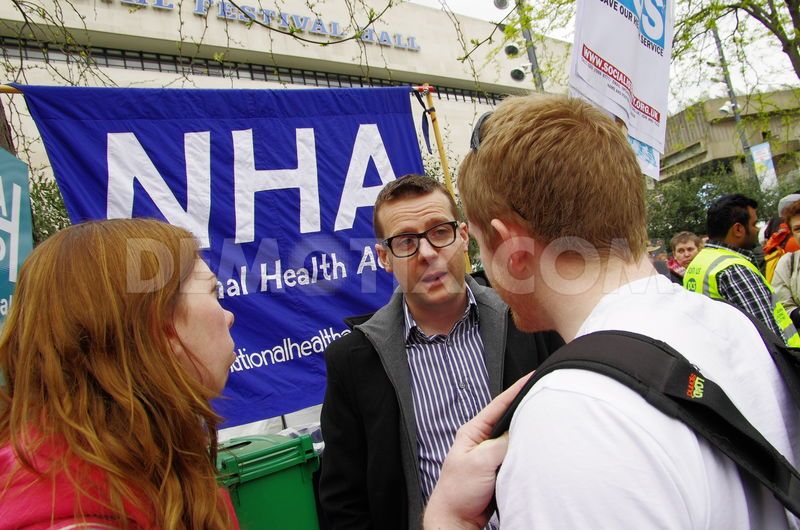 David Cameron blatantly lied to the country over NHS privatisation, says the co-leader of the National Health Action Party on the eve of his protest marathon to the Tory party conference.
David Cameron blatantly lied to the country over NHS privatisation, says the co-leader of the National Health Action Party on the eve of his protest marathon to the Tory party conference.
Dr Clive Peedell, who’s running 42 miles on Sunday morning from the HQ of NHS England in Leeds to Manchester, says there’s incontrovertible evidence that the Coalition is privatising the NHS – despite repeated claims by the Conservatives and Liberal Democrats that their NHS reforms would not lead to increasing privatisation.
Dr Peedell, the co-chair of the NHS Consultants Association also insists that privatisation of the NHS is a false economy as it is both expensive and inefficient.
In an article for Open Democracy, Dr Peedell demonstrates there is clear evidence that:
The Health and Social Care Act clearly fulfils all the commonly accepted criteria for healthcare privatisation, proving the Prime Minister has clearly misled the public, or in common language – lied.
He goes on:
If the public knew the full implications of what this would actually mean for the NHS, potential support for private provision of NHS services would plummet.
Dr Peedell argues forcefully against the assertion that it doesn’t matter who provides the service as long it’s free.
Privatisation needs a market… Market systems drain billions of pounds from the NHS budget and away from frontline care, by the creation of a huge bureaucracy of commercial contracts, accounting, legal challenges, advertising and billing.
He points out that administration costs of the NHS soared from 5% to 14% of total budget when Margaret Thatcher introduced the NHS internal market in 1991; this, he says, will increase further as “the current system is even more complex, bureaucratic and costly with three levels of bureaucracy replaced with seven”.
Dr Peedell explains that:
Private firms cherry pick the most profitable services… and leave local NHS Hospitals underfunded to pick up the pieces and deal with everything else they are expected to deal with – the full and comprehensive range of healthcare services to local communities.
And he warns that privatisation:
creates a vicious circle of increasing health care costs and financial pressure on the NHS. It leads to staff cuts, hospital and ward closures, increased waiting lists, and fewer core services provided by the NHS.
He explains how staff transfers from NHS hospitals to private hospitals (which don’t train their own staff) take vital expertise out of the NHS and how “patients have different parts of their care performed in different hospitals depending on the contracts that CCGs have signed up to. Quality is put at risk, expertise diluted, and costs driven up.”
He predicts that a failing NHS will only help boost private healthcare insurance for those that can afford it, “signalling the death knell for a universal healthcare service, free at the point of use.”
And he attacks “the revolving doors culture between the private health firms, politicians, think tanks, and civil servants within the Department of Health”.
Dr Peedell also demonstrates how the economy is damaged by the use of the private sector in the NHS:
Since public funds are used to pay for private sector provision of NHS services, taxpayers’ money is going directly into the profits of multi-national private companies and their shareholders. It is diverted away from direct patient care, and also diverted outside of our economy. Many of these companies are also registered in offshore tax havens. Privatisation of the NHS is a false economy.
Why are Labour and the National Health Action Party playing so hard-to-get with each other?
This is a totally independent post and does not represent the views of the Socialist Health Association.

Despite being a rather corporate slogan, ‘diversity’ is much valued, and maybe Labour should welcome a new ‘kid on the block’? If the next big thing of 2012 was ‘muscular liberalism’, perhaps Labour should not adopt a stance of ‘divisive socialism’ against newbies, the National Health Action Party (@NHAParty). Why are Labour and the National Health Action Party playing so hard-to-get with each other? This issue has been all-the-more crucial to address with the imminent by-election in the safe Tory/LibDem seat of Eastleigh.
No doubt Labour will have a full frontal range of attitudes and emotions towards the National Health Action Party: in my circle of followers on Twitters, opinions have ranged from, “they’re definitely worth listening to” to “they’ll be lucky if they get 10 votes”. Labour cannot escape from discussing the NHS, even if it feels it can still play a ‘strong hard’, but much like all else they do they run the risk of taking Labour voters for granted on the NHS.
Dr Clive Peedell (@cpeedell) doesn’t want the creeping marketisation of the NHS to go any further. Andy Burnham MP (@andyburnhammp) was the person who ventured out into ‘NHS global’, so that Foundation Trusts could sell their products abroad under the NHS logo, and who continued the march of the NHS Foundation Trust machine.
However, Andy feels now ‘enough-is-enough’. Despite being from the Labour (and some would say “New Labour”) stable, Andy has signalled that he wishes to repeal the Health and Social Care Act (2012). Of course, reversing the changes in it presents a more formidable challenge, but Andy says that he wishes to reverse Part 3 of the Act. This is code for getting rid of the fact that private companies, to which the NHS has been increasingly outsourced, will not be ‘competing’ to do what the NHS is supposed to do, using the NHS logo to maximise their own shareholder dividend. The unfortunate effect of engaging domestic and international competition law has become the ludicrous situation where the NHS cannot be given any preferential treatment for fear of offending European law, ‘distorting’ the market and so on.
There are strong economic arguments for not running the NHS in a fragmented piecemeal outsourced fashion; not least the NHS can benefit economically from ‘economies-of-scale’ and there is hope that with the proper leadership it can further national policy. Unfortunately, Sir David Nicholson and his army have stayed in situ when cultural change, when – in fact – a new charismatic change leader, is need to drive a move away from his failed ‘efficiency savings’. Efficiency was managerial speak for a Frederick Taylor-approach to management, looking at productivity and activity, meaning that one Foundation Doctor would be running around all the geriatric wards for the whole-of-the-night while his or her colleague was doing all the geriatric admissions in Casualty, to save money. The fact that you cannot have ‘something for nothing’, a popular philosophy of Thatcher, is borne out by the 400-1200 deaths in Stafford, where the inaction by the health regulatory bodies has been striking, and the political reaction somewhat confused.
In innovation, it’s possible for a new entrant to dislodge an incumbent by a slight subtlety. That is the basis of the splendid body of work by Prof Clay Christensen at Harvard Business School. However, nobody is expecting the NHA Party, co-founded by Dr Clive Peedell, a NHS oncologist, to dislodge Labour. However, Labour have openly admitted that Eastleigh is 285th on their “hit list”, so many question indeed Ed Miliband’s wisdom in spectacularly losing a safe Hampshire seat.
We have seen coalitions can work for one of the parties within it. We have also seen single-issue parties getting MPs somehow, such as Caroline Lucas in Brighton. If you park aside the perceived differences of NHA Party and Labour, given that Labour is “the party of the NHS” with its own brand loyalty, it might be conceded that Labour not winning does not further the NHS debate. It is possible that, as a protest vote against the Conservatives and Liberal Democrats, the NHA Party do indeed have a fighting chance of getting one MP.
And what is the point of one MP? Well what is the point of a handful of Liberal Democrats? In practice management techniques, such as PRINCE2, it is customary for there to be a ‘senior user’ as well as a ‘senior customer’ on your project board. While many will balk at the idea of ‘customers’ of NHS, unlike Prof Karol Sikora at the weekend on BBC’s “Sunday Politics”, there is a lot to be said, arguably, for input from frontline doctors and other healthcare staff in the NHS debate.
To delve into business management speak, which has possibly crippled the NHS thus far, the NHA Party and Labour have important synergies in values and competences in their outlook on the NHS. Ironically, there is an active debate about how collaboration, as well as (or rather than) competition, should be encouraged. It might be time to ‘think the unthinkable’, and consider the vague possibility that Labour, while desperately trying to fight for an electoral majority in 2015 despite the statistical odds, might benefit from a strategic alliance, or partnership, with the NHA Party. This does not need to be a formal joint venture, but, to expand the business analogy, could be a clever way for Labour to reaffirm its commitment to the NHS and for the NHA Party to gain ‘market entry’. Given that the traditional media appear not to allow the NHA Party to discuss the agenda fully, this may not be a bad thing, I feel.
Please feel free to contact me on @legalaware if you wish to have a constructive debate about any of the issues therein. Many thanks.
Eastleigh: Collaboration, not competition, is what we need from Labour and the NHA Party
This is a totally independent post.
Clive Peedell doesn’t want the creeping marketisation of the NHS to go any further. Andy Burnham MP was the person who ventured out into ‘NHS global’, so that Foundation Trusts could sell their products abroad under the NHS logo, and who continued the march of the NHS Foundation Trust machine.
However, Andy feels now ‘enough-is-enough’. Despite being from the Labour (and some would say “New Labour”) stable, Andy has signalled that he wishes to repeal the Health and Social Care Act (2012). Of course, reversing the changes in it presents a more formidable challenge, but Andy says that he wishes to reverse Part 3 of the Act. This is code for getting rid of the fact that private companies, to which the NHS has been increasingly outsourced, will not be ‘competing’ to do what the NHS is supposed to do, using the NHS logo to maximise their own shareholder dividend. The unfortunate effect of engaging domestic and international competition law has become the ludicrous situation where the NHS cannot be given any preferential treatment for fear of offending European law, ‘distorting’ the market and so on.
There are strong economic arguments for not running the NHS in a fragmented piecemeal outsourced fashion; not least the NHS can benefit economically from ‘economies-of-scale’ and there is hope that with the proper leadership it can further national policy. Unfortunately, Sir David Nicholson and his army have stayed in situ when cultural change, when – in fact – a new charismatic change leader, is need to drive a move away from his failed ‘efficiency savings’. Efficiency was managerial speak for a Frederick Taylor-approach to management, looking at productivity and activity, meaning that one Foundation Doctor would be running around all the geriatric wards for the whole-of-the-night while his or her colleague was doing all the geriatric admissions in Casualty, to save money. The fact that you cannot have ‘something for nothing’, a popular philosophy of Thatcher, is borne out by the 400-1200 deaths in Stafford, where the inaction by the health regulatory bodies has been striking, and the political reaction somewhat confused.
In innovation, it’s possible for a new entrant to dislodge an incumbent by a slight subtlety. That is the basis of the splendid body of work by Prof Clay Christensen at Harvard Business School. However, nobody is expecting the NHA Party, co-founded by Dr Clive Peedell, a NHS oncologist, to dislodge Labour. However, Labour have openly admitted that Eastleigh is 285th on their “hit list”, so many question indeed Ed Miliband’s wisdom in spectacularly losing a safe Hampshire seat.
We have seen coalitions can work for one of the parties within it. We have also seen single-issue parties getting MPs somehow, such as Caroline Lucas in Brighton. If you park aside the perceived differences of NHA Party and Labour, given that Labour is “the party of the NHS” with its own brand loyalty, it might be conceded that Labour not winning does not further the NHS debate. It is possible that, as a protest vote against the Conservatives and Liberal Democrats, the NHA Party do indeed have a fighting chance of getting one MP.
And what is the point of one MP? Well what is the point of a handful of Liberal Democrats? In practice management techniques, such as PRINCE2, it is customary for there to be a ‘senior user’ as well as a ‘senior customer’ on your project board. While many will balk at the idea of ‘customers’ of NHS, unlike Prof Karol Sikora at the weekend on BBC’s “Sunday Politics”, there is a lot to be said, arguably, for input from frontline doctors and other healthcare staff in the NHS debate.
To delve into business management speak, which has possibly crippled the NHS thus far, the NHA Party and Labour have important synergies in values and competences in their outlook on the NHS. Ironically, there is an active debate about how collaboration, as well as (or rather than) competition, should be encouraged. It might be time to ‘think the unthinkable’, and consider the vague possibility that Labour, while desperately trying to fight for an electoral majority in 2015 despite the statistical odds, might benefit from a strategic alliance, or partnership, with the NHA Party. This does not need to be a formal joint venture, but, to expand the business analogy, could be a clever way for Labour to reaffirm its commitment to the NHS and for the NHA Party to gain ‘market entry’. Given that the traditional media appear not to allow the NHA Party to discuss the agenda fully, this may not be a bad thing, I feel.
Please feel free to contact me on @legalaware if you wish to have a constructive debate about any of the issues therein. Many thanks.
Chris Huhne, Lord Ashcroft, the Tories, the LibDems and the NHA Party: a perfect storm
The National Health Action Party (@NHAParty) have an excellent chance of winning Chris Huhne’s seat Eastleigh, and here’s the rub, the Conservatives’ very own Lord Ashcroft has provided an excellent explanation why.
Chris Huhne, Lord Ashcroft, the Tories, the LibDems and the NHA Party create a “perfect storm”:
This therefore shows the popularity of the Conservatives in decline, but not as massively in decline as the Liberal Democrats.
I certainly don’t think Eastleigh voters are unintelligent: I just think they’re incredibly badly informed.
According to Lord Ashcroft from recent polling evidence, “Conservatives lead on getting the economy growing and creating jobs, as well as dealing with the deficit. Moreover, voters tend to credit these policies to the Conservatives, not their junior partners. Overall, Cameron and Osborne are more trusted to run the economy than Miliband and Balls by a wide margin – but Lib Dem voters are no more likely to choose the government team when Nick Clegg is mentioned alongside his coalition colleagues. If voters see the campaign in terms of national issues, then, the Conservatives are in a very strong position.”
That Eastleigh voters care about national issues is of massive interest. The general election in 2015 is likely to turn the phrase ‘it’s the economy stupid’ on its head, as ordinary voters prioritise what is happening in the NHS as important. This is of no surprise with Labour and the Conservatives having rewarded failure in a management based culture, where people such as Sir David Nicholson and his ‘set’ have been winners, despite deaths estimated in the region of 400-1200 at Mid Staffs NHS Foundation Trust.
It is a barefaced lie that the “deficit has been cut by a quarter”, and this is borne out from many different sources which are dead easy to Google. The most recent figures show that current borrowing has fallen by just 6.4 per cent since 2010, while net borrowing has fallen by 18.3 per cent. The coalition reduced net borrowing by 24 per cent between 09/10 and 11/12 but only by slashing infrastructure spending by 42 per cent and tipping the UK into a double-dip recession and, perhaps, a triple-dip recession. The UK Statistics Authority have asked the Government not to repeat the fraudulent claim that NHS spending has gone up, but the Government has ignored their request.
So voting for the Conservatives on the strength of national issues such as the economy is total bunkum.
Even Lord Ashcroft provides himself an adequate explanation for why the NHA Party could in fact do extremely well:
“Despite their disdain for the established parties, voters are very reluctant to vote for independent candidates, however much they may like the idea in principle. Both the main parties could at least form a government, and will have policies in all areas that have some chance of being implemented. In practice, independent candidates largely serve as receptacles for protest votes.
Recent years offer two notable exceptions: in 2001, Dr Richard Taylor was elected in Wyre Forest on a platform of restoring the Accident & Emergency unit at Kidderminster Hospital, and in 1997 Martin Bell was elected in Tatton on a platform of not being Neil Hamilton. These examples show that for an independent candidate to win, they need an issue that is very local, very specific and very popular. They also need the connivance of at least one major party – Labour dropped out in Tatton, and the Liberal Democrats did not stand in either seat. None of these conditions are in place for Dr Peedell’s group.”
The NHS is continuously an important issue, and so is Chris Huhne.
Chris Huhne dramatically changed his plea this week by pleading guilty to perverting the course of justice over claims that his ex-wife Vicky Pryce took speeding points for him 10 years ago. The judiciary absolutely loathe the criminal offence of perverting the course of justice as it threatens the very foundations on which the English legal system is based.
In October 2012, it was reported that, through papers unearthed under the Freedom of Information Act showed, in June 2012 4.8 per cent of patients waited over six weeks for diagnostic tests, against a target of 1 per cent. “Capacity issues in endoscopy, ultrasound and cardiac tests have impacted performance significantly in June. This will incur some small contractual financial penalties for the foundation trust.”
A&E performance in 2011 was reported as extremely bad at Winchester and Eastleigh NHS Trust, where several target breaches around waiting times both for elective treatment and in its emergency department had been reported also. The acute trust was given a red rating for its time to initial assessment in accident and emergency, which was recorded at two hours and 19 minutes for the 95th percentile – against a target of 15 minutes. It was also over the target of a one-hour median wait to treatment, with an average of one hour and 21 minutes.
The NHA party candidacy at Eastleigh will also be a first electoral test for the government’s Health and Social Care Act, which was primarily drafted by the Conservatives on behalf of the corporate lobbyists, but driven through last April only with support from Liberal Democrats like Chris Huhne in the Commons and decisively in the Lords.
Party co-chair Clive Peedell (@cpeedell), a cancer specialist from Teesside, said:
“We believe the Eastleigh by-election offers a huge opportunity to radically alter the nature of our broken political system. For too long the three main political parties have betrayed the trust of the UK public in a tide of political sleaze and dishonesty.
The LibDems in particular have betrayed their grassroots supporters by supporting a Conservative-led coalition that is undermining and privatising our public services with no democratic mandate, and pushing forward an austerity package that will cause long-term damage to our country.”

